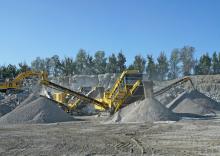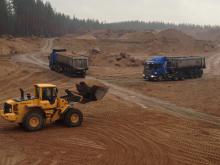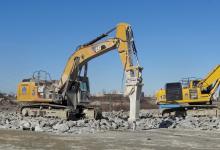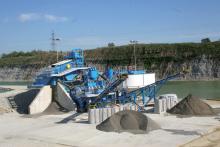
Opting for a fully-electric combination of
The impressive saving forecast by PT and Keestrack was made after the R6e and C6e began operating at PT’s Väo Quarry in June 2019. Connected to the grid, the new plant set-up cuts PT’s cost per final product tonne to €0.42 per tonne, compared to the calculated total of €0.58 per tonne of the same machine duo’s annual diesel-electric powered operation (approx. 600,000 tonnes a year).
The reduction of pollutant emissions on site through all-electric crushing and classifying is also significant, with around 400 tonnes per year of climate-damaging CO2 avoided.
Since the installation of the R6e and C6e, the three-man working teams (excavator-wheeled loader-all-electric plants operator) have also been reaching their daily production target of 3,000 tonnes in one long or two short shifts, bringing further significant savings compared to the previous three-shift pattern, requiring 15 PT personnel.
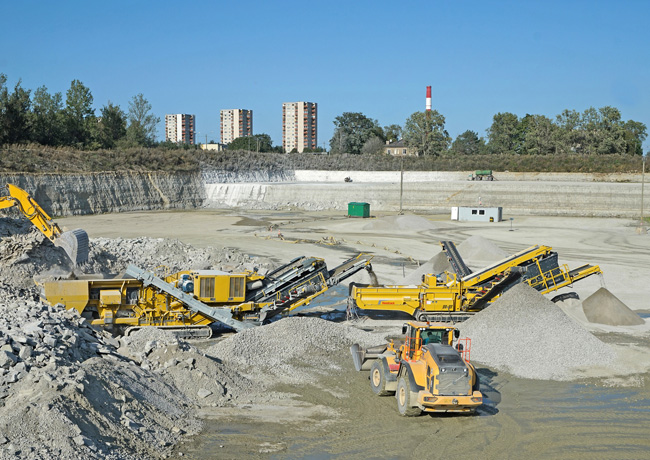
The modernisation of the PT quarries’ set-up cost just under €1mn, with 35% of funding being provided by the Estonian Environmental Investment Centre (EIC) using EU regional funding. The significance of the project was demonstrated by the presence of numerous high-ranking representatives from politics and business at the new all-electric plant configuration start up.
PT has now also become part of the international Keestrack network. As of 1 September 2019, the company officially took over as the Belgian crushing and screening equipment maker’s new sales and service supplier in Estonia and neighbouring Latvia.
Offering up to 400 tonnes of material per hour and four defined final end products, the R6e and C6e in fully-electric grid operation is said to have impressed PT management with their high efficiency and low environmental impact, while still offering the full flexibility of the diesel-electric hybrid drive.
Since 1959, Paekivitoodete Tehas – ‘Limestone Factory’ in English – has supplied high quality mineral and aggregates for the Estonian road and construction industry. From 1989, the former state-owned enterprise was gradually transformed into a private company and developed into one of Estonia's leading construction materials suppliers, under the leadership of the long-standing director, today's chairman of the board and majority shareholder, Vladimir Libman.
Today, up to 20% of the Estonian annual demand for crushed aggregates comes from PT’s Väo and Maardu quarries, with their combined extraction quantity of around 750,000 tonnes of material per year. Together with washed sand and gravel from mining residual masses with high contents of fines or clay and marl impurities and the company’s recycling activities, PT’s total production amounts to around 1.2 million tonnes per year.
On the Baltic coast, high-quality limestone is found close to the surface in 5-6-metre widths. In the past, PT has responded to the rapid growth of aggregates demand with three decentralised stationary processing units (totalling 400 tonnes per hour), whose raw materials, intermediate and end products had to be extensively hauled by rigid trucks. This low-efficient operation became problematic as the mining zone with its dust and noise emissions moved ever closer to the equally rapidly expanding Tallinn residential district of Lasnamäe, and its 120,000 inhabitants.
To minimise the impact of its quarrying activities, due to last, given mineral reserves, for at least the next seven years, the company relies on low-emission technologies wherever possible on its 176-hectare Väo quarry site. Instead of blasting, the stone is quarried by 95% by hydraulic hammer – further relief brings investment in modern low-emission and low-noise machinery and equipment.
Correspondingly, the comprehensive modernisation of the processing technology, along with an optimisation of the production processes, focussed especially on the protection of residents and a general reduction of the environmental impact. To replace the existing installations, a mobile processing line for the production directly in the mining zone was favoured for the main Väo quarry site as well as for temporary operations in the smaller Maardu quarry (150,000 tonnes per year), 10kms away.
The entire PT processing modernisation project was supervised by Johann Prüwasser, CEO of Keestrack Engineering, the Austrian design and development branch within the Keestrack Group.
“Like all other suppliers, we found PT’s required high throughput of 375 tonnes per hour from 0/800mm to 0/63mm and the optimal distribution of the end products 0/4mm, 4/16mm, 16/32mm and 32/63mm a real challenge, given the high quality but very tough raw material. However, we were able to exactly match the crushing characteristics of the heavy impact crusher in the R6e to the material, especially with regards to the necessary high rotor speed.
“With double deck hanging screen and oversize recirculation, we now achieve high feeding quantities of 250 tonnes per hour of -32mm material to the connected C6e and deliver a good 30% 4/16mm main end product as requested by the customer," explains Prüwasser. "We were able to realise the customer's intended all-electric operation in the Väo quarry with all the advantages of our proven track-mounted technology,” he adds.
Two 200-metre cables from the specially installed 400V transformer station on the quarry floor now feed the Keestrack R6e and the downstream C6e classifier, directly connected to the crusher via power supply and communication cable for data exchange between the plant controls.
Powerful electric motors for the crusher drive (250kW) and the pump units of the central plant hydraulics (R6e: 90kW, C6e: 45kW) as well as electric belt drives and ancillary units enable complete emission-free operation. If the plant combination has to be relocated in the course of the extraction process, both plants simply disconnect from the grid and follow the excavator on their own, using their on-board diesel/generators units. The independent diesel-electric drive also ensures economic temporary operation in Maardu quarry, which is additionally aided by the combined 95-tonne transport-friendly weight of the Keestrack plant combination (R6e: approx. 62 tonnes, C6e: around 32 tonnes).

